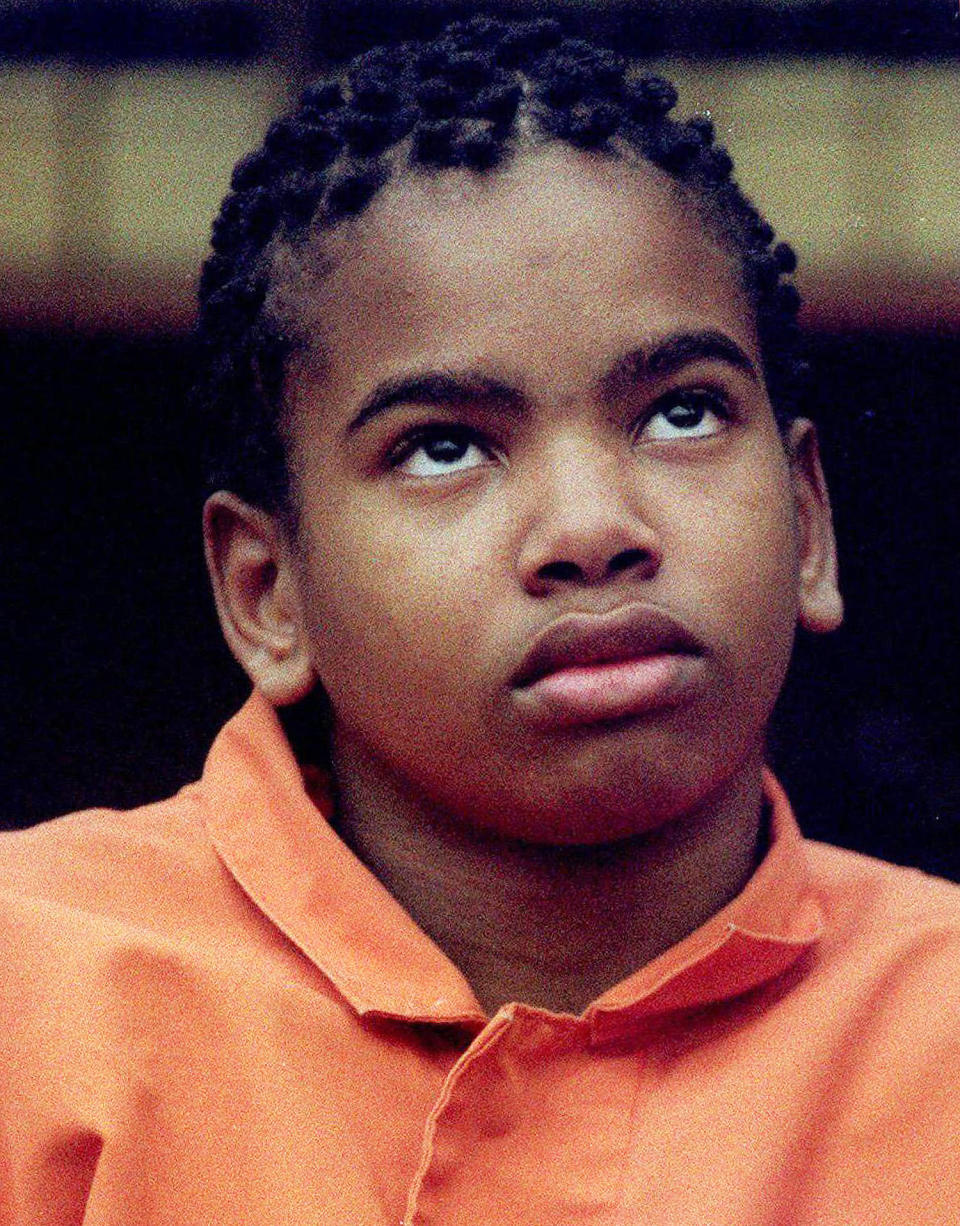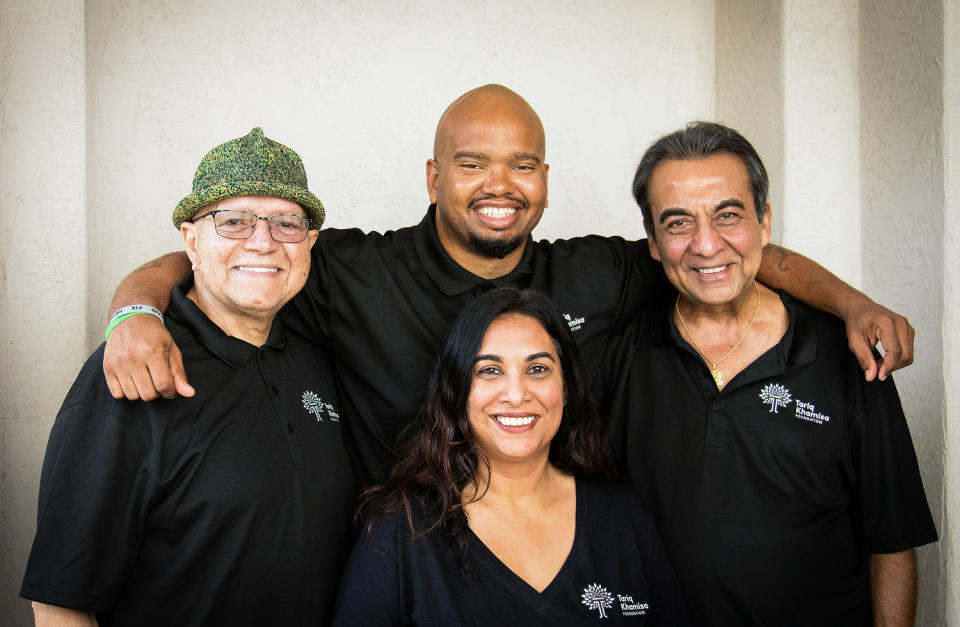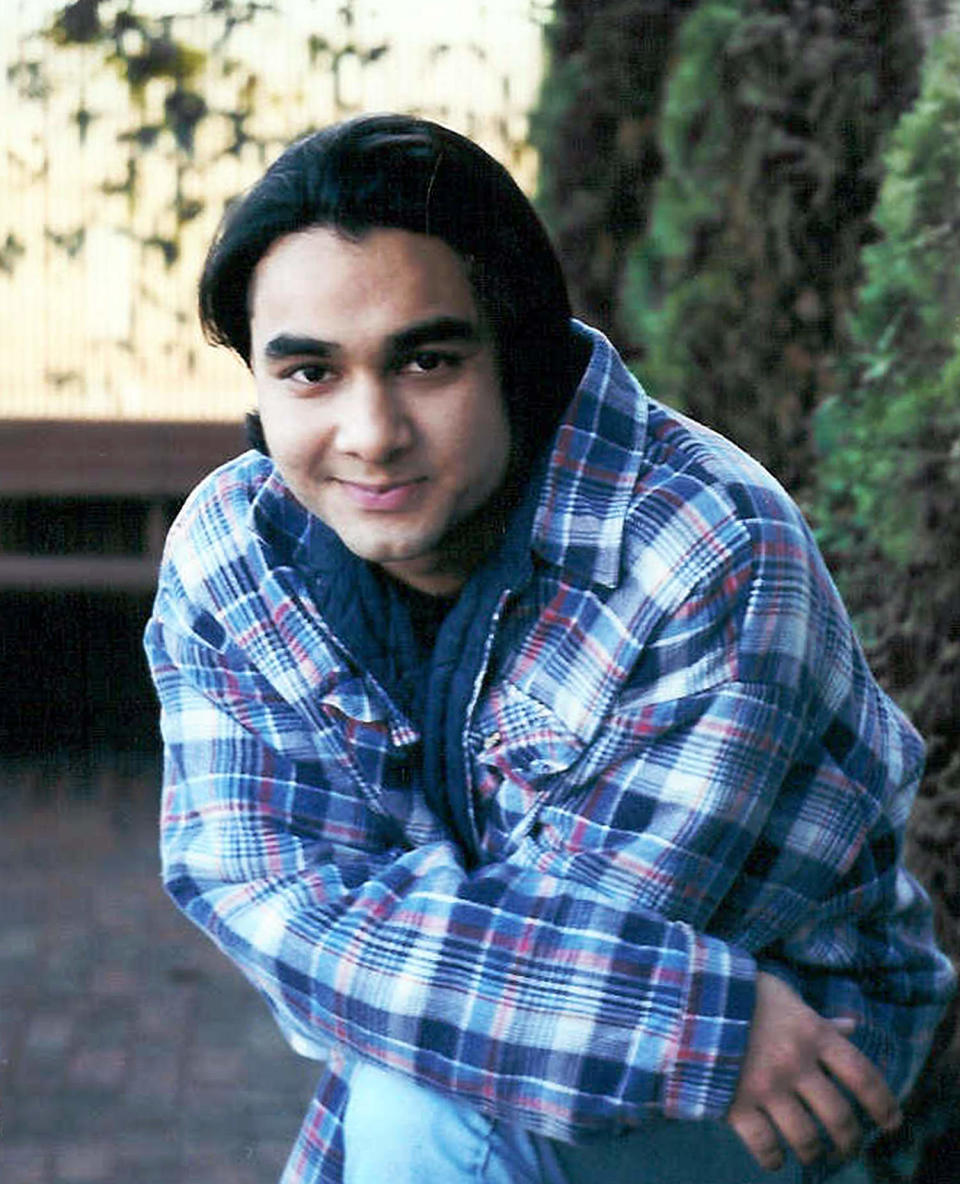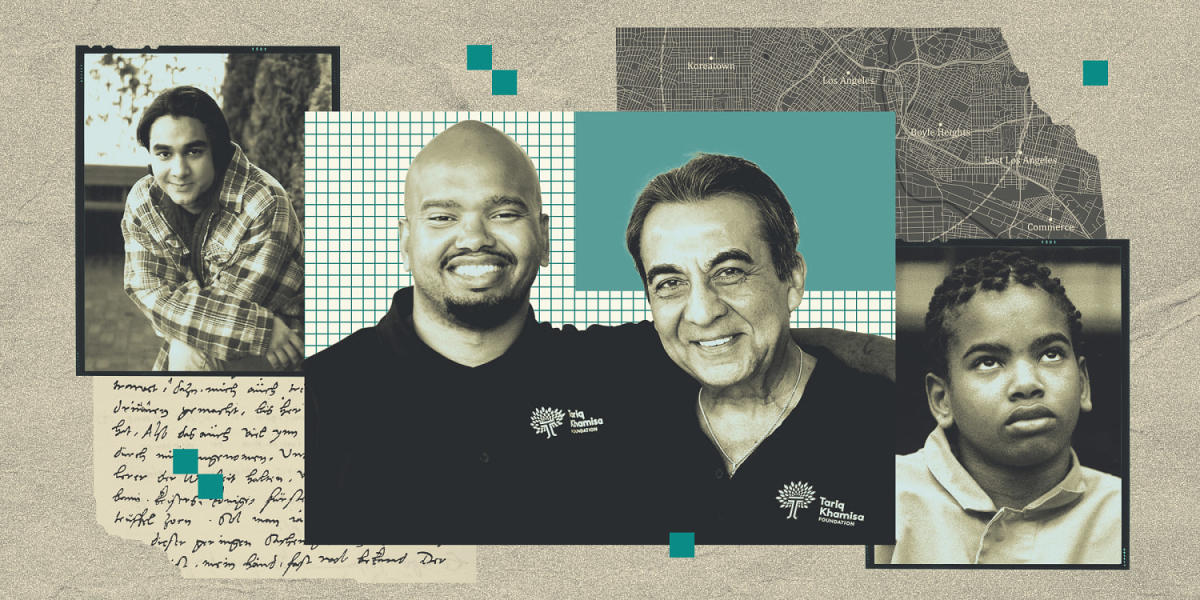Azim Khamisa was standing in his kitchen on the night of January 21, 1995, when the phone rang.
It was a homicide detective who had terrible news. Khamisa’s 20-year-old son, Tariq, a journalism major at San Diego State University, had been killed while delivering a pizza.
“My knee-jerk reaction was, ‘This can’t be right. It must be a mistake,” Khamisa, 75, told TODAY.com. He hung up and dialed Tariq’s number. Surely he would answer.
Instead, Tariq’s live-in girlfriend, Jennifer, answered the phone, sobbing. Earlier that evening, Tariq was lured to a fake address and then ambushed by young gang members from South Central Los Angeles as part of an initiation ritual.
“I lost the strength in both my legs and fell to the ground,” Khamisa said.
Three days later, a baby-faced 14-year-old boy named Tony Hicks was taken into custody. The eighth-grader pleaded guilty and was sentenced to 25 years to life.
He became the youngest person in California to be charged as an adult.
‘The decision to pull the trigger was mine’
Hicks, now 43, is down-to-earth when he talks about his youth. His mother, a gang member, was 14 when she had him, and his father was not in his life. He lost three young cousins to gun violence. Hicks joined a gang in sixth grade because, as he puts it, “that’s what people in my family did.”
“It was normal to see someone get shot,” Hicks told TODAY.com.

There is pain in Hicks’ eyes as he recounts the events of January 21, 1995. He had run away from his grandfather Ples Felix’s house that morning after they argued about him not going to school and drinking. Hicks was a latchkey kid before moving in with Felix and says he had no respect for authority.
“That’s when I decided I was going to bond with the only family I thought I had left, which was my fellow gang members,” says Hicks.
That evening, when Tariq refused to hand over the pizza or his money, an 18-year-old gang member urged Hicks to pull the trigger.
“Ultimately, the decision to pull the trigger was mine. I didn’t want to be seen as weak or ineffective among my gang members,” he says. “But I’ve come to realize that the decision also came from my anger and disappointment at how my life had turned out.”
Choosing to forgive his son’s murderer
“My friend said to me, ‘I hope he’s frying in hell,’” Khamisa recalls. “I don’t see it that way. I see there are victims on both sides of the gun.”
Khamisa practices Sufism, a mystical form of Islam, and it is customary to observe a 40-day mourning period after a death. At the end of the 40 days, the mind is believed to move into a new consciousness in preparation for its next journey.
During that period, Khamisa prayed, wrote and meditated for hours.
Tariq’s death “was like an atomic bomb had exploded in my heart,” Khamisa says. “When the explosion subsided, God sent me back with the wisdom that my son was not the only victim.”
Khamisa’s spiritual advisor advised him to do “good, compassionate deeds” in memory of Tariq, because these acts of kindness “provide powerful fuel for the soul’s forward journey.”
Nine months later, after the loss of his son, Khamisa, an investment banker, started the Tariq Khamisa Foundation, also known as TKF, a restorative justice organization and mentorship program for at-risk youth.
One of the first people Khamisa hired was Hicks’ grandfather and guardian, Ples Felix, the very person Hicks had fought with on the morning of Tariq’s death. Felix, a retired Green Beret with a bachelor’s degree in political science, had tried to keep Hicks away from bad influences. He was sad, just like Khamisa.
Khamisa says he never hesitated to contact Felix and work with him.
“I lost my son and Ples lost Tony, who was like a son. Tony calls him daddy,” says Khamisa. “I said to Ples, ‘I can’t get Tariq back and you can’t get Tony out of the criminal justice system, but what we can do is make sure other parents and grandparents don’t have to suffer like we did. .’ We can stop children from killing children.”
Meeting his son’s killer
It took Khamisa five years, and much prayer and meditation, before he felt ready to meet Hicks.
“I wasn’t sure how I would react when I came face to face with the person who pulled the trigger on my son over a lousy pizza,” Khamisa says. “I had to spend thousands of hours in meditation before I could go to him. For the first few years, he used his bravado as a gang member.
Khamisa says he asked Hicks some “very tough questions,” and Hicks answered them honestly. He was more mature and self-confident than Khamisa expected of him. The moment that changed everything, Khamisa says, was when he and Hicks looked at each other for “an awkward amount of time.”
“I didn’t see a murderer,” Khamisa says. “He was polite, he was remorseful, he was articulate. He had transformed himself.”
“I didn’t expect any of this,” Khamisa adds. “He was a likeable boy.”
Before leaving Folsom State Prison, Khamisa made an offer to Hicks. He gave Hicks the promise of something he’d never had before: purpose.
“I said, ‘When you get out, you can come and work at the Tariq Khamisa Foundation,’” Khamisa says. “We have a job for you.”


Believing in life after prison
As Khamisa left the high-security facility outside Sacramento, California, he said he was “a lot more jumpy” than when he entered.
“I had completed my journey of forgiveness,” he says. “It was as if a huge albatross had fallen off my shoulders.”
The next day, Felix told Khamisa that his grandson had done a complete 180 seemingly overnight. His grandson sounded happier. Hicks felt he did not deserve Khamisa’s forgiveness, but he no longer believed he would die in prison.
“I grew up in prison with guys who had been there for 35 years when I arrived,” Hicks said. “No one talked about their future, and suddenly I had a responsibility. I wanted to prove to Azim that I was worth it.”
Hicks, who as a little boy dreamed of becoming a scientist before the gangs came to power, passed his GED test, Khamisa says, and started reading everything he could find. He also started blogging for the Tariq Khamisa Foundation.
“I will forever carry with me a great deal of shame and guilt for Tariq’s murder, as well as for the state of mind I was left with long after that night,” Hicks wrote in a message. “But where my immaturity caused me to run from the shame and guilt of my actions, I am now motivated by the knowledge of the pain I have caused and a sense of responsibility to make amends to those I have hurt and to try to atone for the life I took.”


Khamisa and his daughter, Tasreen, advocated for Hicks’ parole in 2018.
“I explained to the commissioner that Tony has work to do – not behind bars, but at the foundation,” Khamisa said. “I knew he would save a lot of children.”
In April 2019, Hicks was released from prison at the age of 39.
“I think I would still be in jail if it wasn’t for Azim,” he told TODAY.com. “Azim’s forgiveness and my grandfather’s unwavering support kept me connected to my humanity while in prison.”
Hicks’ return to society was not easy. He had spent more than 24 years behind bars and had never lived on his own or paid bills.
“I had to temper my expectations quite a bit as I rediscovered the world,” Hicks wrote in a 2019 blog post on the foundation’s website. “Trying to find work and being rejected, adjusting to the fear of learning to drive a car, reconnecting with family with distance between us. But I’m one of the lucky ones.”
Today, Hicks works as a plumber and sits on the foundation’s board. He and Khamisa speak to thousands of at-risk youth every year. Hicks says he considers Tariq’s sister Tasreen his sister, while Khamisa is like a father.
He says he is still working on forgiving himself for Tariq’s murder.
“I love Tasreen, I love her children. I love Azim,” says Hicks. “I can’t look at them and not think about what I took away.”
“Forgiveness is a muscle I have to train every day,” he adds.
Khamisa has written five books on the subject of forgiveness, finding fulfillment and peace. He has been recognized by the Dalai Lama.
It’s been 29 years since Tariq was murdered, and Khamisa thinks about him every day. He often eats with his son, sitting next to his photo and talking to him.
“My altar is there with his photo and flowers. I light a candle and sometimes some incense and I tell him what’s going on. He talks to me all the time,” says Khamisa.
Khamisa thanks God every day for choosing forgiveness. That choice made a huge difference in Hicks’ life, and in his own life as well.
“It allowed me to find joy again,” he says.
This article was originally published on TODAY.com







